Inanna, Queen of Heaven and Earth Her Stories and Hymns from Sumer Diane Wolkstein, Samuel Noah Kramer: 9780060908546: : Books
$15.15
Additional information
| ASIN : | 0060908548 |
|---|---|
| Publisher : | Harper Perennial; First Edition (August 3, 1983) |
| Language : | English |
| Paperback : | 256 pages |
| ISBN-10 : | 9780060908546 |
| ISBN-13 : | 978-0060908546 |
| Item Weight : | 2.31 pounds |
| Dimensions : | 9.04 x 6.08 x 0.68 inches |
| Best Sellers Rank: | #878 in Folklore (Books) |
| Customer Reviews: | 433 |

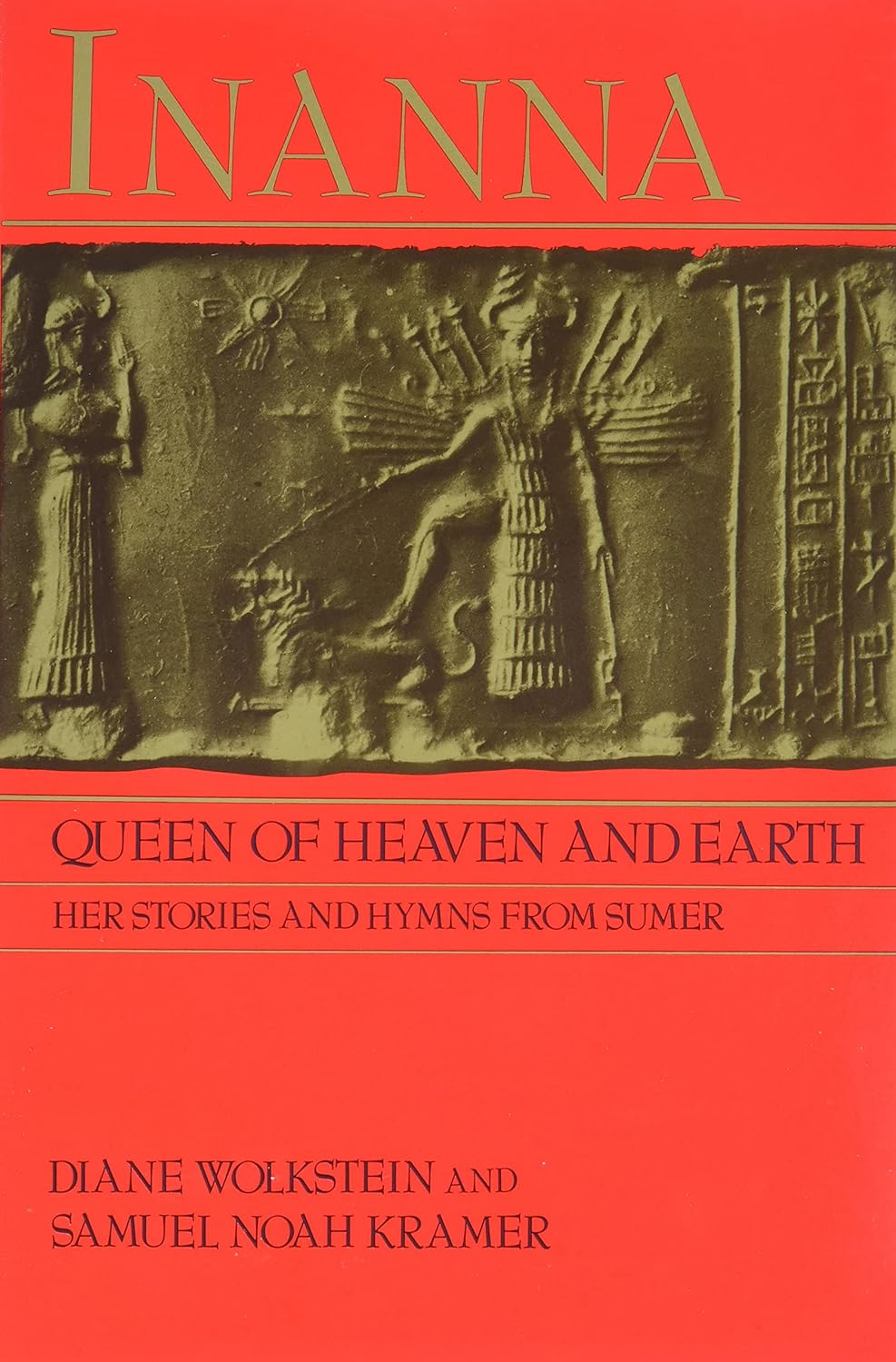
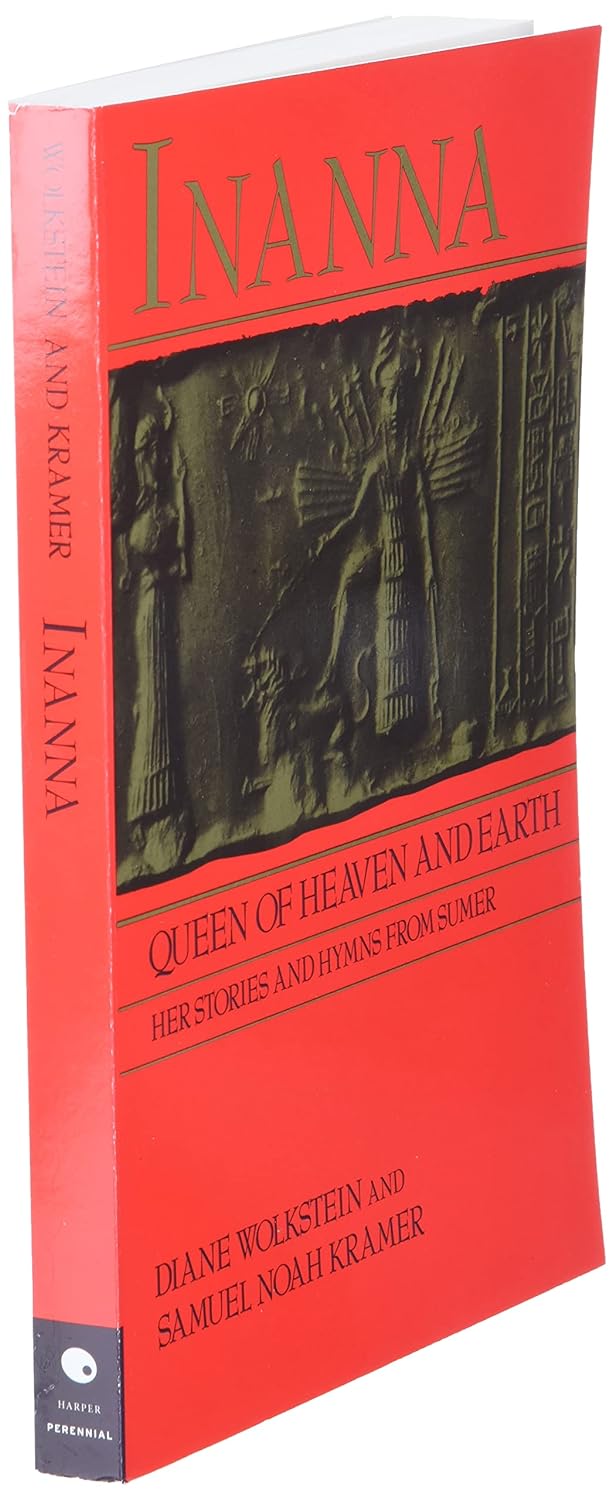
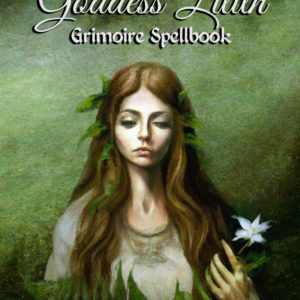
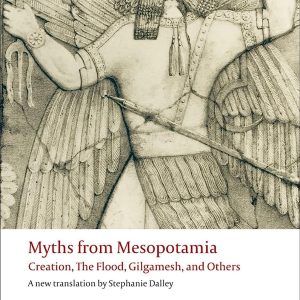
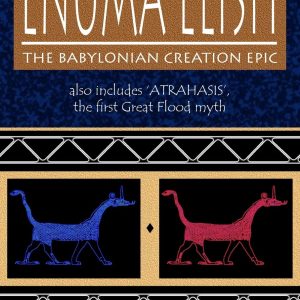
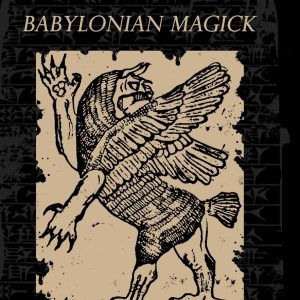
5.0 out of 5 stars
Inanna
An excellent, sensitive translation, a brilliant invocation of ancient myth that captures the spirit of Sumer. I highly recommend it
One person found this helpful
5.0 out of 5 stars
Five Stars
An excellent translation and explanation of some truly amazing myths.
4.0 out of 5 stars
DO NOT get kindle version.
As others have pointed out, the scan to kindle did not work, and there is no content. The material, and this author are first rate, but not the kindle edition.
One person found this helpful
5.0 out of 5 stars
Inanna is a hit
I loved this book…easy to read & well written. I recommend it to anyone who wants to learn more about Inanna’s story.
5.0 out of 5 stars
Five Stars
An encounter with the beauty of the femenine inspiration!
5.0 out of 5 stars
Five Stars
excellent
5.0 out of 5 stars
Inanna: Goddess of Heaven and Hell
This book was a fantastic read. I recommend any girl power supporter to read and discover the power of ancient goddesses.R.L.Rex
5.0 out of 5 stars
Good background study
Interesting reference work. Good background study.
5.0 out of 5 stars
Five Stars
Wonderful book!
One person found this helpful
5.0 out of 5 stars
Five Stars
good
One person found this helpful
5.0 out of 5 stars
Inspiring window on the great Sumerian goddess
The result of a collaboration between Sumerian scholar Noah Kramer and folklorist Diane Wolkstein, this book is a thoughtfully annotated translation of the major Sumerian cuneiform texts devoted to the goddess Inanna-among the oldest religious texts in the world. It is illustrated with black-and-white reproductions of ancient Sumerian art, mostly on clay tablets.Our understanding of Sumerian culture continues to grow as new texts are found and our perceptions change. This book was published in 1983, and included material unknown to the general public at the time. There are four major stories of Inanna told here: “The Huluppu Tree,” “Inanna and the God Of Wisdom,””The Courtship of Inanna and Dumuzi,” and the extended epic “The Descent of Inanna.” Seven hymns to the goddess round out the collection.In “The Huluppu Tree,” we meet the adolescent Inanna, expectantly awaiting the attainment of her queenship. The Huluppu tree, which she has planted and tended as a symbol of her hopeful authority, becomes infested with evil creatures, like personal demons, that will not depart and bring her to despair. She eventually appeals to Gilgamesh to vanquish the demons, and they exchange gifts made from the wood of the tree, bringing them both to greater power.In “Inanna and the God of Wisdom,” Inanna, now sexually mature but still youthful and unproven, is welcomed by Enki, God of Wisdom, who acts the role of proud grandfather, giving a feast in her honor. Enki’s magnamity increases as he drinks, and he ends up offering Inanna all the magical keys to human civilization. Inanna, with enthusiastic politeness, accepts the gifts, and then makes a quick exit, getting a head start before Enki thinks better of his generosity and sends his monsters in pursuit of the errant goddess. Inanna, with the help of her trusted companion goddess, gets passed the monsters and arrives in Uruk withher magical cargo, where she comes into her full power. Enki, apparently wise enough to let go of his greed in the face of fate, acknowledges Inanna’s victory and ascendance.In “The Courtship of Inanna and Dumuzi,” Inanna, after some initial resistance, enters into an erotic courtship with Dumuzi the shepherd. This text is strangely alluring, moving with untroubled ease from sexual frankness to touching detail. (The scene where Dumuzi knocks on the door of Inanna’s house for the first time feels like it could have come straight from a modern teenager’s diary). After the marriage is consummated, Dumuzi curtly informs Inanna that he’s going to be very busy being king now-don’t wait up, hon. This poignantly rapid slide from courtship to neglect sets the scene for events in the next narrative.In “The Descent of Inanna,” the goddess, now Queen of Heaven and Earth, finds herself drawn to enter the underworld, realm of the dead, ruled by her evil and somehow tragic sister-self, Ereshkigal. One by one, she is stripped of all the symbols of her power at seven gates, to be left naked and alone before the Queenof the Underworld, who kills Inanna with a single blow and hangs her on a hook to dry. Inanna has planned her own rescue in advance, though, and escapes to the surface, thronged by demons intent on finding someone to take her place. Inanna will not surrender to them her loyal sons, but when she returns to find her husband Dumuzi, not in mourning, but proudly sitting on his thrown and dispensing authority, she strikes him down and sends the demons after him. The tale of Dumuzi’s flight is nightmarish and filled with dream imagery. Thanks to the efforts of his compassionate and self-sacrificing sister, and the softening of Inanna’s own anger, a Persephone-like bargain is reached, and Dumuzi is allowed to return to the living for half of each year.The hymns that round out this book are an exciting glimpse of the actual religious practice of the Sumerians. Especially interesting for modern Pagans is the annual ritual wedding between goddess and king.I’m someone who tends to be rather skeptical about the ancient precedents of modern goddess worship, but these texts caught me off my guard. They are amazingly modern (or is it timeless?) in their content. The goddess actually grows psychologically and spiritually through the series of narratives, and theportrayal of the sexual dynamic between men and women rings uncannily true across four millennia. Inanna’s story is the original heroine’s journey. And, unlike most of her male counterparts, she doesn’t need to kill anything to attain her spiritual victory. (Well, almost. Dumuzi gets a serious lesson in raw goddess power!). Her character seems to flow from woman to goddess and back again so smoothly, that it is impossible not to feel a living religion in these texts, one in which there was an intimate dialog between the powers of the goddess and the human experience of her priestesses.These original texts are better than any modern retelling of Inanna’s story I have come across, not just because they are more “authentic”, but because they are hauntingly moving. Unlike the familiar mythology of the Greeks and Romans, which has come down to us in a more or less “literary” style, these works seemmore spiritual, even liturgical. Repetition is combined with a directness of wording, and the result is often very powerful; there is a primal intensity about them. They disarm you with their open, almost child-like language, and then leave you sitting, mute and amazed, in that timeless central cavern of the human experience.
252 people found this helpful
5.0 out of 5 stars
Great book
This is a great book and definitely want to add to your collection if you’re into this type of stuff it was very informative and I’ll be looking to buy more books from this writer
5.0 out of 5 stars
Most fascinating read about our origin
Like the simplicity of the narrative and independent explanation or rather details that put you right there in that time and dimension.
One person found this helpful
5.0 out of 5 stars
Yass, QUEEN!
Literally the QUEEN OF EVERYTHING, these hymns to Inanna are worth passing through your consciousness.They are at the same time delicious, beguiling, sensual and sexual.All hail the Queen!
5.0 out of 5 stars
Who’s Your Daddy?
Meaning no disrespect, Inanna had a very interesting creation (birth) and an equaly impressive life as Queen of the Indus Valley. She was a go-getter and dyanamic skycraft pilot (there are stone effigies that show her in goggles and some sort of a skycraft) — according to Zechariah SItchin. Yes I am aware that Dr Kramer quetions Sitchin’s interpretations of the 250,000 Sumerian tablets and scrolls, but she was a real person, and the headline to this article is a pointer to the fact that whereas the Anunnaki were reptilian, she was the first along with Marduk to be a human hybrid — and a beautiful one! That genetic legacy has come down to us today in the 13 Families (Adapa +) called Elites– bloodlines are very important.As for the book, it is very accurate, it reflects the MEs that she stole from Enki — they were crystals containing the programming for many aspects of Sumerian society — today we have something similar in our flashdrives. In addition, when she dies in the Underworld, she is brought back to life (pp 64-65) by the Water and Food of Life… Anunnaki had the ability to resurrect recently dead people… and that was also recorded in The Book of Enki.There is an interesting follow-on to Inanna’s story as TJ Hegland examines The Sacred Feminine and also profiles her.Dr Kramer is an expert on Sumer and the hstory of that area, I have another of his books, and Diane Wolkstein has done a great job of making Inanna live thru poems, prose and elegies – very easy to read (not boring at all) she even provides one of the few geneological family trees of Inanna that I have ever seen (found prior to the Preface). Kudos to both authors.
22 people found this helpful
4.0 out of 5 stars
That old-fashioned religion
Inanna was truly THE goddess. She was child, woman, and elder. She was part of life, and of the underworld. Enki, her father and the god of wisdom, bestowed on her every holy gift he had, including his wisdom.That brings up a second point. These are very down-to-earth gods. Beer – brewed grain – was an important part of their diet, if only because the alcohol granted some level of disinfection. Enki lavished his riches (and beer) on his beloved guest. The more beer he lavished on her and on himself, the more gifts he granted. Next morning, he woke up and asked his aides “What happened? – I did WHAT?” By then, Inanna was away with the goods.As a fertility goddess, Inanna had no equal. The stories go on at length describing the holy rites of fertility. She joyously embraces her own fertilization, or at least a good hearty attempt at it. What more could one ask of a goddess?The myths are truly wonderful stories, from the oldest written language in the West. The book is a collaboration of translator and mythologist, and seems stronger for both of their efforts. Each adds a useful commentary to the text, as does the artist who chose the authentic Sumerian artwork that decorates the text. Still, it seems clear that much has been lost to history, or has not yet been recovered form the fragmentary texts. As good as these stories and hymns may be, they’ll just get better as more tablets are translated and more pieces puzzled together. It’s a dicey process, though. As much as I enjoyed these stories, I wondered whether the pieces had been puzzled together correctly, or even belonged together. Awaiting further discoveries, no one can know.Inanna was a contemporary of Gilgamesh, who appears briefly. She is a natural complement to his story, and gives a wider view of that very early point in Western history.//wiredweird
20 people found this helpful
5.0 out of 5 stars
The Prototype Mother Goddess
Read the words of worshippers from ancient Sumer see what they thought about their goddess.
One person found this helpful
5.0 out of 5 stars
Charming Vision of the First Religion
At any rate, the first goddess we have writings about. There is a naïveté in the simple, repetitive storytelling of the ancient Sumerians who discovered the magic of combining religion with the written word. Inanna (with the help of her faithful companion Ninshubur) lives out her motto “I’ll take it!” to the full. Love, sex, war, feminine wiles, and probably rock-and-roll (yet to be discovered in archeological digs): no wonder Inanna (later Ishtar and probably Ashtoreth of Biblical infamy) was the most popular deity of thousands of years. One might say she still is!
9 people found this helpful
5.0 out of 5 stars
Extraordinary
This is an unmatched blend of scholarship and poetry. No other book like this exists. It presents all of the source texts about Inanna in beautiful, easy-to-read verse, sharing stories ranging from the creation of the world to the death of Inanna’s husband, Dumuzi. The second half of the book also includes compelling historical and textual analysis, providing a great deal of insight into these texts and the cultural place they held. I cannot recommend this work highly enough; it truly is one of a kind.
6 people found this helpful
5.0 out of 5 stars
So much detail
The authors did a really good job of presenting the information and a detailed, yet very readable format.
4.0 out of 5 stars
Needs to be updated
This is an older book and as far as I know, it has not been revised or updated. Regardless, an excellent read and I am glad I purchased this book. The authors commentary is dated and biased; wish she would have included more scholarly commentary to compliment her own.
3 people found this helpful
5.0 out of 5 stars
Great
Looks like new!
4.0 out of 5 stars
A classic, looking its age.
For the distillation of the myths, themselves, there is nothing quite like this book. It makes the Sumerian myths accessible, but the anthropological interpretations are dated and continue to mislead the public as to current academic interpretations. The wholesale categorization of Inanna as a “fertility goddess” is a naive concept from the ignorant past which contradicts everything we actually know about her role in Sumerian society. A revised edition would be welcome.
2 people found this helpful
5.0 out of 5 stars
Victoria’s Books – Great Seller Resource
Inanna: Powerfully Significant Literature & Historically Great Gift of Knowledge/One of the Best Scholarly written, Wolkstein and Kramer translates most beautifully, recognizing the Ancient Texts with enlightening commentaries. Illustrations of Art & Poetry from “the Lady who ascends into the Heavens,” are majestically radiant, “first daughter of the Moon!” A Heritage of Love, Nature and of the Human condition. A most compassionately thrilling rediscovery with cover design presented by Gloria Adelson. This image celebrates a remarkable story cycling for thousands of years…
1.0 out of 5 stars
Wolkstein Betrays Womanhood
Wolkstein has turned a highly educated and successful astronomer and poet into a Grecian Venus figure. Her treatment of Inanna is not only a lie but also so heavily distorted as to turn Inanna into a failed housewife and promiscuous, neither of which she was. It’s as if Wolkstein didn’t even read the beginning of the MS. I do not recommend this book. It’s neither scholarly nor tolerable. I’m surprised it was published. Inanna was Goddess or Heaven and Earth. Her Father had given her the “me” — which has never been translated — which included her right to go into the Underworld and also to Return from the Underworld. Wolkstein might have consulted Campbell regarding the Heroine’s journey but she did not.It’s this phenomenon of women trashing women which is the big concern among think women today. I just feel disappointed and angry about what Wolkstein has done; apparently she has access to everything, took time to do research, and even had help from others. She has betrayed Inanna.May mountains move and the full wrath of the real Inanna be upon Wolkstein.
14 people found this helpful
5.0 out of 5 stars
Inspirational
This is solid story-telling and translation of the most compelling goddess from human record. The two make a perfect pair and really bring Inanna to life. I was writing a fiction story that has Inanna as a supporting character, and I read this book twice to really get a feel for the depth and drive that Inanna displays. It was instrumental in my writing and also inspirational in my life. Hats off to these two for this stellar book.
11 people found this helpful
1.0 out of 5 stars
Kindle version has no content
Like others I have downloading the kindle version and it has no content. I tried asking for a refund but it wont let me. I can’t delete it or I have to repurchase it. I looked at how to resolve this on amazon and there are not relevant help articles. What is going on?
3 people found this helpful
5.0 out of 5 stars
Arrived fast and better condition than described
Great condition. Arrived fast and had no marksSo far into the book I’m enjoy reading the peoms and songs outloud i can feel like im back in time telling the beginning of the gods.
4.0 out of 5 stars
A reader’s thoughts
I am glad I read this book first; the scholarly way the author tells the story of the oldest writings known to humanity make it comprehensible and put it in historical context. The songs in the ancient words echo down the millenia….
5.0 out of 5 stars
Great read!
Very good collection of Ishtar stories that should be added to anyone’s collection of ancient Mesopotamian works.
One person found this helpful
5.0 out of 5 stars
Fantastic introduction to Inanna’s greatness
I’m a pretty big nut when it comes to Sumerian gods and goddesses, so this book was a no brainer. I also have “Inanna: Lady of the Largest Heart,” which I would highly reccommend in addition to this book for those who want to learn more about Inanna and Sumeria.This is mostly a collection of short hymns to Inanna, and show her gentle side. Some of the hymns are rather explicit in their descriptions of sex, something kind of out of character for a goddess of love (and of war, let’s not forget!). A lot of the poems are really heartwarming, for lack of a better term. I’d actually read some of these to my girlfriend for “romantic poetry,” and we both enjoyed them (even though she isn’t really into the Sumerian stuff).There are a lot of copies of the ancient Sumerian tablets and images of Inanna, which will really help you get a clear picture of her.The second half of the book is information about Inanna and Sumeria, not exactly really interesting for me, but well written. This would be the best book to pick up for those interested in Inanna, then check out “Lady of the Largest Heart.”
12 people found this helpful
2.0 out of 5 stars
Too expensive
Required college reading for daughter. Took long to ship and the price wasn’t the best. Not sure what happened to the Amazon used book (actually fair prices) for a used book but, this isn’t worth a 5 star rating. Sorry
5.0 out of 5 stars
Perhaps more relevant now then ever.
Incredibly cool to be able to read perhaps the earliest human written stories & poetry. Great deeper meaning in regards to the relation of the revered feminine in conjunction with respected masculine, and their connection to heaven/earth. The authors did a lovely job with the text. Very interesting how religions following this one in a historical text took so much inspiration from these stories. I studied historical world myths and knowing those, along with current mass religions, then reading this book…well, lets just say one can see where much of their material came from. I read passages occasionally to friends, and they are always shocked when I tell them how old this is…it is still very relevant – if not extremely relevant right now in our current world climate.
22 people found this helpful
4.0 out of 5 stars
Execellent Source
The moon goddess – Ishtar, Demeter, Inanna – a foundation of the goddess principle for more than 3,000 years. This text does a nice job of bringing the Sumerian version – Inanna – to the modern reader. The translation – in verse – is readable, logical and mystical. The exceptional commentaries and artwork in the book bring the reader into the background and environment of Sumeria – interpretation of the legends and stories in light of their relationship to the times and culture – as well as hypothesis on interpretation as they relate to other cultures and the modern reader. A great resource for anyone interested in the topic.
5 people found this helpful
5.0 out of 5 stars
“… and she applauded!”
Page 12:”When she leaned against the apple tree, her vulva was wondrous to behold.Rejoicing at her wondrous vulva, the young woman Inanna applauded herself.”Inanna then gets the idea to go see Her father, the God of Wisdom, and gets from Him all manor of wisdom. She then distributed it amongst Her people.If more myths showed women as seeing how wonderful they were and then understanding that we are capable of getting and distributing wisdom amongst our own people then there would be no need for feminist movements, phrases like “glass ceiling” or the degrading of our wisdom as “old wives tales”. I enjoyed this book immensely and so did the men who took the same class with me that this book was assigned for. Most of them lamented a culture (ours) in which women are not taught to applaud their vulva and made to feel that we have no wisdom to share.
29 people found this helpful
5.0 out of 5 stars
I recommend this book a lot
It may not be what ypu expect, but you’ll appreciate it.
5.0 out of 5 stars
The queen of disney..
Vile.
5.0 out of 5 stars
Stunning
In the “White Goddess”, Robert Graves speaks of true poetry as that which sends chills up your spine because it clearly has divine origins. While Graves’ work does not meet that standard, “Innana” more than does so. With the fist stanza, “In the first days, in the very first days, in the first weeks, in the very first weeks, in the first years, in the very first years”, you enter a primal Dreamtime where the the Goddess exists as a real being made tangible by enchanting words. It takes a true poet to translate words from a dead language into a modern one and have them retain their effect. Wolkstein does this with grace and power. The imagery of the tales and hymns themselves is lush, erotic, and real. I reccomend this book for anyone interested in finding a sacred text that opens up a living channel to the Goddess.
51 people found this helpful
4.0 out of 5 stars
Good stuff
I wasn’t as enthralled by Diane Wolkstein’s rendering of the myths as most folks seem to be. She seems to be rather full of herself when she speaks about it. Though I will give her big kudos when it comes to her notes to the stories. These are very good and in many ways give me verification to many of the ideas I had when I was reading the stories. Samuel Kramer’s section was his usual, interesting all around. I especially enjoyed the very detailed “Annotations of the Art” by Elizabeth Williams-Forte. Very detailed explanations for all the graphic pieces which are displayed throughout the text. I highly recommend this book for those interested in Sumerian studies.
3 people found this helpful
5.0 out of 5 stars
Four other helpful books on this subject are Barbara Mor’s The Great Cosmic Mother
Perhaps see my comments about Asia Shepsut’s JOURNEY OF THE PRIESTESS (“The Priestess Traditions of the Ancient World — A Journey of Spiritual Awakening and Empowerment’). Both of these books are part of the insightful recognition that ancient societies’ respect of women and their cultures have a tremendous importance for us today who live under the oppression of male dominated cultures and religions such as Muhammidism, Judaism and Christianity. Four other helpful books on this subject are Barbara Mor’s The Great Cosmic Mother, Barabara Walker’s The Crone and Riane Eisler’s The Chalice and the Blade and her Sacred Pleasure. Dive in. Our current world lacks the wisdom of these ancient societies with their women gods and culture!
13 people found this helpful
5.0 out of 5 stars
One of my most cherrished books
One of my most cherished books. Beyond words
3.0 out of 5 stars
love the book
love the book. but it was advertised as a hardcover copy. i’m not going to return it due to the hassle, but i could have gotten a paperback copy for 1/3 of the price or less. great book by kramer and Wolkstein.
One person found this helpful
5.0 out of 5 stars
A great read for women
Great story of Inanna who volunteets to go to the underground!!! The place of darkness. Ee all get there in our lifetime more yhsn one time. If you buy this book, buy also Descent to the Goddess a way of initiation for women
One person found this helpful
1.0 out of 5 stars
The kindle version doesn’t have text
The kindle version has no text, just lines… I’ve tried in all my devices (ipad, iphone and kimdle) and the document has the same 5 pages of lines
2 people found this helpful
5.0 out of 5 stars
Ancient civilisation
This is a great collaborative work bringing illumination on the Sumerian civilization and on the essence of Innana herself. Romantic, otherworldly stories and hymns transport the reader to the root of humanity, the ancient writings clearly displaying what makes us (humanity) really tick, whatever the era.
3 people found this helpful
5.0 out of 5 stars
This book is my bible
Favorite book. It perpetually occupies the top of my reading list.
5.0 out of 5 stars
Inanna for everyone
Learned a lot about Inanna. I reread it often.
5.0 out of 5 stars
A good informative read, written with passion and gusto!
A lovely book about a very lovely Goddess and so much more. The Epic of Gilgamesh sure sounds a lot like the later myth of Noah’s Ark. Read for yourself and decide.
One person found this helpful
1.0 out of 5 stars
Kindle version is blank
I purchased the kindle version and it has only five pages with no text.
2 people found this helpful
5.0 out of 5 stars
I can’t recommend this enough
I can’t recommend this enough. It is by far the most approachable translation of the ancient texts that I have come across.
One person found this helpful
5.0 out of 5 stars
I recommend it above all others
Ishtar is my patron Goddess, and I found this book incredibly enlightening and interesting. If you are interested in learning about Inanna/Ishtar, you must definitely read this book! I recommend it above all others.
4 people found this helpful
4.0 out of 5 stars
Good Book!
What I expected and then some! La, la, La, la, La, la, La. filling up with more words as required.
5.0 out of 5 stars
Great book
This book goes back to the “roots” of The Mother Goddess in written literature. A very comprehensive telling of the ancient stories as well as pictures of artifact of that time make this a great buy for anyone interested in the histories and mythologies of The Mother Goddess.
4 people found this helpful
3.0 out of 5 stars
very nice quality!
Was practically a new book, very nice quality!
3.0 out of 5 stars
Thanks
I won’t say that I’m not pleased with my purchase, however I will say that the merchandise can’t be described as very good. My biggest complaint is that about one quarter of the cover is sun-faded, which I don’t remember in the description. Overall, C+.
5.0 out of 5 stars
Inanna,Queen of Heaven and..Diane Wolkstein
I love this legends,history wrapped with myth of the creation. Women please read it you love it.
5.0 out of 5 stars
Excellent!
This translation/interpretation from the cuniform tablets gives an excellent feel for the culture from which this mythic cycle emmerged. The detailed information contextualizing the stories that forms the second half of the book is an invaluable resource for understanding the depth and breadth of the these stories.
5.0 out of 5 stars
Highly Recommended
I could not put this book down. It incresed my interest in the goddess Inanna and Sumerian mythology so much I immediately purchased (from amazon.com) Inanna, Lady of Largest Heart : Poems of the Sumerian High Priestess by Betty De Shong Meador.
One person found this helpful
5.0 out of 5 stars
Five Stars
So wonderful! If you are interested in mythology, this is a must read.
One person found this helpful
5.0 out of 5 stars
Inanna
I received a great book; This also one of my favorite written subjects, and would buy from this author again.
One person found this helpful